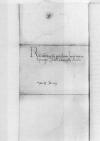List #1166
Sigismund I Jagiellon do Ioannes DANTISCUSVilnius, 1534-[06]-01
| odebrano [1534]-06-12 Rękopiśmienne podstawy źródłowe:
Pomocnicze podstawy źródłowe:
Publikacje:
| ||||||||||||||||||||
Tekst + aparat krytyczny + komentarzZwykły tekstTekst + komentarzTekst + aparat krytyczny
Reveren(do) in Christo Patri, domino
Reveren(de) in Christo Pater sincere nobis dilecte.
Redditae sunt nobis cf.
Quae bene valeat.
Ad mandatum


 BNW, BOZ, 953, f. 119v
BNW, BOZ, 953, f. 119v